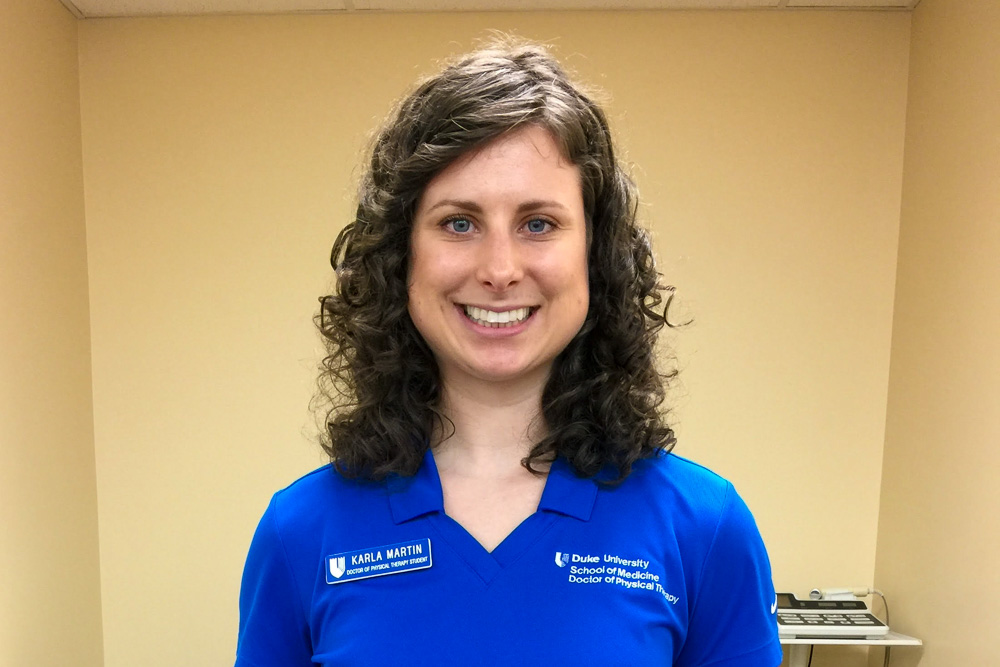Karla Martin graduated from Eastern Mennonite University in 2013 with a bachelor’s degree in biology and pre-physical therapy and a minor in psychology. She is currently pursuing a Doctor of Physical Therapy at Duke University.
Describe your field of study and research at Duke and work during clinical rotations.
My clinical interests remain widespread, encompassing orthopedic, neurologic and vestibular patient management.
My clinical affiliations have allowed me to gain experience in a variety of settings including inpatient rehabilitation, outpatient pediatric, outpatient neurologic, and outpatient orthopedic. I currently see myself practicing in an outpatient clinic as this setting affords much variety in patient population and the needed clinical skill sets.
My research at Duke has encompassed the wider topic of health policy. Because patients with chronic conditions have needs that go beyond the usual scope of primary care, coordination and collaboration among multiple providers is necessary for the provision of high quality, comprehensive care. In order to reduce costs and improve care coordination to best meet the needs of these complex patients, research on the implementation and effectiveness of various comprehensive primary care models has emerged. These models target the primary care setting by organizing and coordinating care between the general practitioner and other interdisciplinary team members specific to patient needs.
I, with two fellow students, wanted to explore the effectiveness of four identified comprehensive primary care models by reviewing the existing research on their associated costs and utilization of healthcare services, patient-specific outcomes, and satisfaction. Additionally, we wanted to better understand the role of the physical therapist as an interdisciplinary team member within these models. Our research has been compiled into a scoping review entitled “Comprehensive Primary Care Models for the Management of Multiple Chronic Conditions in Older Adults” and is in the process of journal submission.
How did your academic studies and professors at EMU prepare you for your graduate studies?
My professors at EMU prepared me for my graduate studies by providing opportunities for problem-solving, guided research, scientific reading and writing, and small-group work. They challenged me to think critically and inspired me to always be curious. They encouraged me to wrestle with and organize the academic material into ways that made the most sense. They offered office hours or would stay late after class to answer individual questions. Their passion for teaching and helping students achieve their academic and career goals was so evident.
My academic studies at EMU provided the prerequisite coursework for applying to a number of physical therapy schools. EMU also offered courses outside of those basic science prerequisites that further expanded my learning and helped prepare me for a job working with people in healthcare, such as sociology of health, social psychology, senior seminar, and ethics courses.
What do you think made your application to graduate school stand out among others?
I think my array of undergraduate experiences and what I’ve learned from those opportunities helped me stand out among others. Playing collegiate volleyball, serving as a community adviser and biology student mentor, gaining cross-cultural experience in the Middle East, and participating in organic chemistry research in Hawaii and Guam marked these formative years. These experiences shaped my passions for serving others, embracing challenge, and pursuing health and wellness, ultimately leading me to pursue a career in physical therapy.
What attracted you to attend EMU as an undergraduate?
In all honesty, EMU was not high on my personal list of schools to attend. I simply applied because my parents, who both attended EMU, wanted me to apply. After doing so, however, I could not pass up the academic scholarship, the opportunity to play collegiate volleyball, or the university’s reputation for having a stellar biology department with high acceptance rates into graduate and medical schools.
What are some favorite memories of your time at EMU?
I will never forget the time when biology professor Jeff Copeland released an entire vial of fruit flies into another student’s book bag as a comical prank, or the feeling of both thrill and fear while performing surgery on lab rats in Dr. Roman Miller’s physiology class. There’s also the memory of going to the “caf” for breakfast one morning and seeing my mother’s baked oatmeal recipe being featured – nothing beats that taste of home! Then, there’s a plethora of memories from cross-cultural in the Middle East, including hiking the Jesus trail, riding a camel through the desert, watching the sunset on Mount Sinai, and gaining new insights into the Bible by studying the geographical landscape with Linford and Janet Stutzman.
What do you think makes EMU graduates distinctive?
The lens through which we view the world makes us distinctive. EMU’s core beliefs surrounding peace and justice, diversity in community, love, and service in both a local and global context are very much instilled into the campus culture through the work of the professors and student organizations. To do justice, love mercy, and walk humbly with God (Micah 6:8) — those words become a part of you and are carried into life after EMU.
